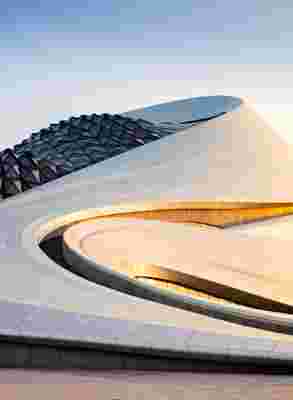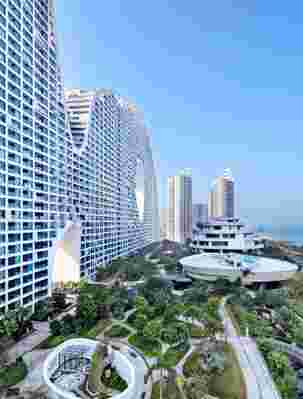MAD Architects Has Set Its Sights on the U.S.
George Lucas, who plans to spend more than $700 million on a namesake museum of narrative art, could have chosen any architect he wanted. In the end the Star Wars creator picked the 40-year-old, Beijing-born talent Ma Yansong, whose buildings might look at home in a galaxy far, far away. In 2014 Ma and his firm, MAD Architects , unveiled designs for a tent-shaped structure to be built on Chicago’s waterfront. Litigation over the property’s land use ensued, and Lucas decided in June of this year to leave Illinois for California. That meant going back to the drawing board. But the filmmaker didn’t abandon Ma, who is now working on proposals for two possible locations.
After a period when Western firms such as OMA and Herzog & de Meuron were busy constructing landmarks in China, a select few Chinese architects are now building in the West. Ma has been the most buzzed-about since he surfaced with a pair of slinky towers near Toronto in 2012. This year he broke ground on his first project in the U.S. (a condo complex in Beverly Hills) as well as in Italy and France. Meanwhile, he continues to work in China, where one of his most daring commissions is under way. Called Fake Hills , it is a huge apartment community designed to resemble a mountain range, part of Ma’s effort to bring ersatz landscapes into urban environments. He sees himself as an interpreter of Chinese sensibilities, specifically the penchant for combining the natural and the artificial into “one continuous experience.”

Designed by MAD Architects, the Harbin Opera House in northern China features a sculptural lobby with timber-clad balconies and stairs.

The swirling façade of white aluminum panels.
Ma is full of contradictions. After studying at Yale, he landed a job with the late Iraqi-born superstar Zaha Hadid . His swirly opera house in Harbin, China, completed last year, reveals her influence, though Ma says his style has evolved. “When you look at her work,” he says, “the lines are very clean, the shape very perfect. My architecture is more random. Sometimes I sketch and then scan my sketch directly, to make the curves more freehand. I don’t want to make perfect industrial curves.”
Lucas remains enthusiastic. As Ma says of his client, “People think of him as a businessman, but he’s very emotional. He trusts his first reactions—and he trusts me.” It’s too early to say what the Lucas Museum of Narrative Art will look like in its California incarnation. But, Ma promises, “it’s going to be quite an experiment.”

Fake Hills, a sinuous apartment complex now under construction in the coastal city of Beihai, China. The firm’s projects are surveyed in the new monograph MAD Works (Phaidon).